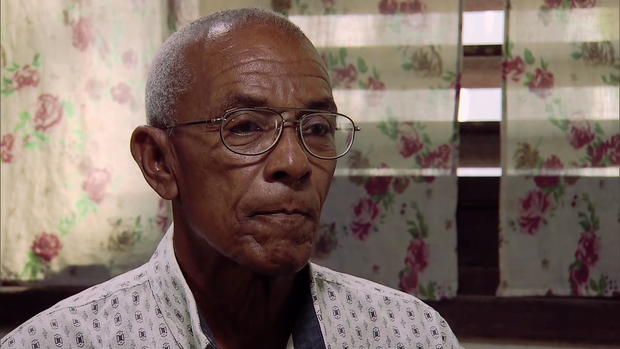American harbored by Cuba fears winds of change
HAVANA, Cuba -- As Fidel Castro's communist revolution fades into the history books this week, one former American radical is still fighting here in Havana.
"I still consider myself to be a revolutionary," he said.
Charlie Hill is a black nationalist accused of murder and hijacking. He has eluded U.S. authorities for 44 years.
The 65-year-old father of three lives on the outskirts of Havana, beyond the reach of the FBI and under the protection of the Cuban government. He lives very modestly - working odd jobs and reliant on a $10 per month government pension - but he does so as a free man.
"Cubans have always given me the great opportunity, I'm very grateful to them," he said during an exclusive interview with CBS News at his home.
Hill fled to Havana in 1971 after he and two other members of a black separatist group known as the "Republic of New Afrika" were accused of fatally shooting New Mexico state trooper Robert Rosenbloom.
The three were driving cross-country when the 28 year old trooper happened to pull over their car. Hill claims an FBI counterintelligence program - known as COINTELPRO - had long been targeting the group because they were black radicals.
Hill insists he did not pull the trigger but said "everyone has a right to self-defense."
He does admit that the three men then hijacked a TWA flight and forced it to land in Havana, where Fidel Castro granted them political asylum. He considered them fellow revolutionaries.
As for trooper Rosenbloom and his family, Hill claims that he thinks of them nearly every day.
"I would say to them that it was regretful, you know, when a person's life has to be taken. And you know, I was the one, I did not kill officer Rosenbloom, and you know, it's sad."
The thaw in relations between the U.S. and Cuba has renewed calls for his extradition.
New Mexico Gov. Susana Martinez recently wrote Secretary of State John Kerry a letter calling Hill a "terrorist" and saying this was a chance to "finally be able to bring a cop killer to justice." A number of members of Congress, including Sen. Tom Udall, D-New Mexico, have joined the call.
Hill refuted those charges and said it is proof that he cannot get a fair trial in the United States.
"If I felt I could get a fair trial, I would go back to the United States of America because I am not a terrorist nor am I a cop killer."
He is just one of roughly seventy American fugitives harbored by Havana, but Cuban diplomats say they will not hand over any of those it considers political exiles. Hill said he believes the Cuban government will protect him. Neither the Justice nor State Departments would comment on his case.
Hill says he still misses the U.S., but is unsure whether he will ever step foot on U.S. soil again.
Yet even in Cuba, Hill said he does not fear entirely safe. His latest worry is that an influx of American tourists might also bring bounty hunters or vigilantes.
"I still fear for my life, you know, even here in Cuba nowadays, with all the Americans coming down here," he said.

